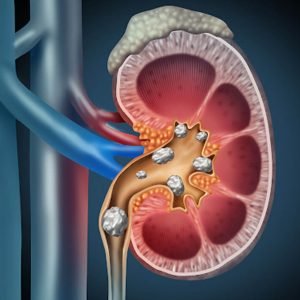What is a Renal Stone?

What are the reasons of Renal Stones in children ?
- The main reasons for kidney stones in children includes dehydration, which leads to concentrated urine and crystal formation.
- Dietary habits, such as high intake of salt, oxalates, and animal protein.
- Genetic predispositions to metabolic disorders like hypercalciuria (excess calcium in urine) and hyperoxaluria (excess oxalates).
- Medical conditions like urinary tract infections (UTIs), obesity, or gastrointestinal diseases that affect nutrient absorption.
- Additionally, children with conditions such as cystic fibrosis or those who take medications that alter urine chemistry may be at a higher risk.
What are symptoms of Renal Stones in children?
- Children may experience intense pain in their stomach, back, or side, which may come like waves. This pain is typically associated with the stone moving or blocking the urinary tract.
- Other symptoms like blood in the urine (Haematuria), frequent urination, painful urination, nausea, vomiting, fever (if infection is present), and irritability.
- In infants, it might be harder to diagnosis without testing, but changes in behavior or crying during urination can be clues.
What are the types of Renal Stones in children?
1) Calcium oxalate stones, the most common type, it is linked to dehydration and a diet high in oxalates (found in spinach, nuts, and chocolate).
2) Uric acid stones, which may occur in children with high uric acid levels due to metabolic conditions like gout or dehydration.
3) Struvite stones, often related to chronic UTIs caused by bacteria that produce ammonia.
4) Cystine stones, a rare type associated with cystinuria, a genetic disorder that causes high levels of cystine in the urine.
How to diagnose or notice Renal Stones in children?
- Doctors normally incept thorough medical history and physical examination.
- Urine and blood tests are done to detect abnormalities in electrolytes, calcium, and oxalates.
- Imaging techniques like ultrasound or X-rays are commonly used to locate the stone’s size and position.
- CT scans used in some cases for more detailed analysis.
What are the treatment of Renal Stones in children?
- For small stones, traditional management like increased hydration and pain relief may be sufficient.
- If the stone is too large or causing hindrance, then more advanced procedures are followed like Extracorporeal Shock Wave Lithotripsy (ESWL), which uses sound waves to break the stone into smaller pieces that can be passed out more easily, or surgical removal (such as ureteroscopy or percutaneous nephrolithotomy) if the stone is resistant to non-invasive measures.
- For recurring stones, doctors may prescribe medications to alter urine chemistry, reduce calcium or oxalate levels, or address metabolic disorders.
How to prevent or treat Renal Stones in children?
- Adequate hydration
- Balanced diet low in salt and oxalates
- Monitoring calcium intake (while avoiding excess).
- Regular follow-up visits with doctor
